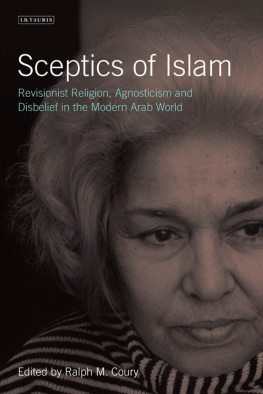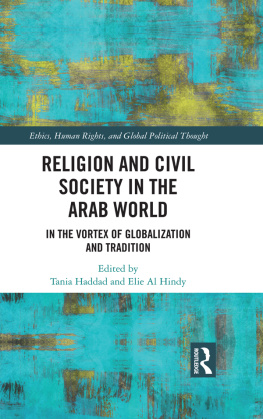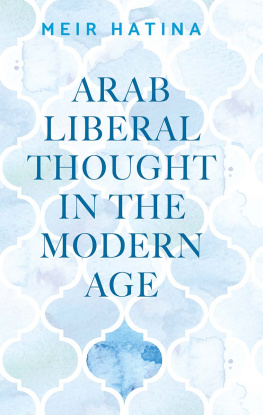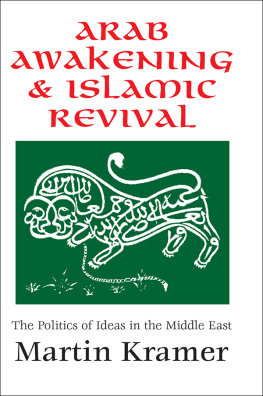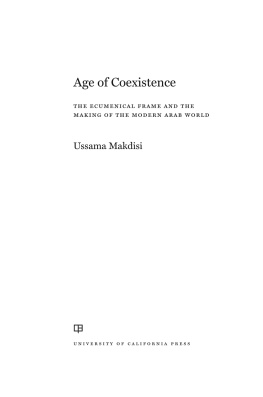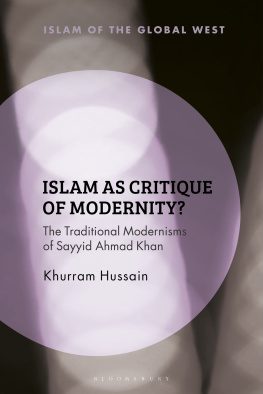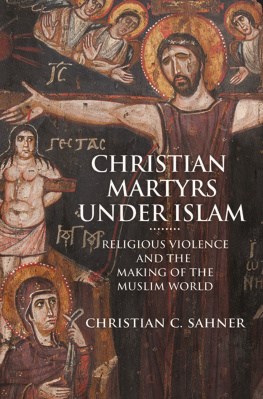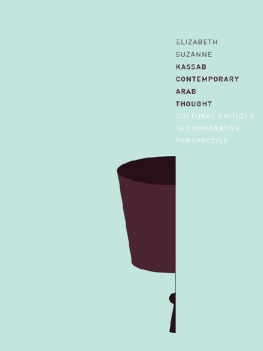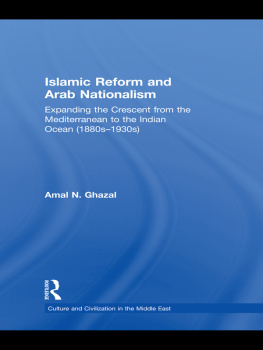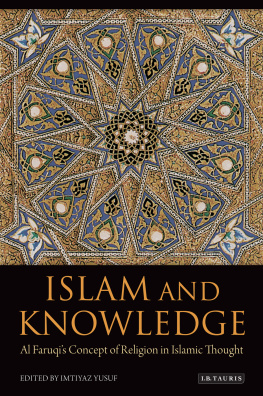
Ralph M. Coury is Professor Emeritus of History at Fairfield University in Connecticut, where he taught for nearly three decades. He has also held positions at Universiti Sains Malaysia and Randolph-Macon College in Virginia. He specialises in the study of Arab political and intellectual history and in Orientalism, and his publications include The Making of an Egyptian Arab Nationalist: The Early Years of Azzam Pasha, 18931936 (1998).
This is an immensely timely anthology. Its carefully selected texts constitute a valuable contribution to our understanding of the rich varieties of modern Arab culture. Muslim and Christian authors alike are granted the opportunity to state their secular and humanistic points of view within an informative framework provided by the editor, Ralph M. Coury. The book can be highly recommended to students of politics, Middle East studies and comparative literature.
Youssef Choueiri, Professor of History, Doha Institute for
Graduate Studies, Qatar and Reader in Islamic Studies,
University of Manchester
Originally spread by racist Orientalism and recently fuelled by Islamophobia, the common Western view of the modern Arab world is that it has been immune to radical critiques of religion. This splendid anthology gives unambiguously the lie to this view as it illustrates, through judiciously selected original passages and in eminently readable translations, that Arab critical thinkers (Muslims and Christian alike, whether believing radical revisionists, agnostics or atheists) have followed similar paths to those of their counterparts outside the Arab world, responding to many of the same socioeconomic, political and especially cultural forces in their aspiration for freedom, social justice and human rights.
Dimitri Gutas, Professor of Arabic and Graeco-Arabic,
Yale University
A spirit of critical, reasoned uncertainty informs this excellent anthology of Arab writers which reflects their chiefly twentieth-century views of religion, culture and society. Each contribution, ably introduced by the editor, is complemented by an overview which makes the volume accessible to the informed general reader as well as helpful to the Middle East specialist.
David Waines, Emeritus Professor of Islamic Studies,
Lancaster University

Published in 2018 by
I.B.Tauris & Co. Ltd
London New York
www.ibtauris.com
Copyright 2018 Ralph M. Coury
The right of Ralph M. Coury to be identified as the editor of this work has been asserted by the editor in accordance with the Copyright, Designs and Patents Act 1988.
All rights reserved. Except for brief quotations in a review, this book, or any part thereof, may not be reproduced, stored in or introduced into a retrieval system, or transmitted, in any form or by any means, electronic, mechanical, photocopying, recording or otherwise, without the prior written permission of the publisher.
Every attempt has been made to gain permission for the use of the material in this book. Any omissions will be rectified in future editions.
References to websites were correct at the time of writing.
Library of Modern Middle East Studies 178
ISBN: 978 1 78453 337 3
eISBN: 978 1 78672 362 8
ePDF: 978 1 78673 362 7
A full CIP record for this book is available from the British Library
A full CIP record is available from the Library of Congress
Library of Congress Catalog Card Number: available
For Melissa
CONTENTS
ACKNOWLEDGEMENTS
Special thanks are due to the following:
Dr R. Kevin Lacey, Associate Professor and Director of the Arabic and Near Eastern Studies Program at Binghamton University, for his elegant translations of several pieces. The translations are very much Kevins, but I have sometimes taken liberty as editor to make revisions. Kevin and I have collaborated on a number of scholarly projects since the early 1990s, including two co-edited books and a journal on Arab culture and thought published by Binghamton University.
Dr Muhammad Ali Aziz, Lector of Arabic at Yale University, who helped in reviewing the translations made for this anthology, and with a dedication that most scholars would never have expended on works other than their own. His contribution, informed by a remarkably broad knowledge of Islamic thought, has far transcended questions of language narrowly conceived.
Melissa Nash Coury, the companion of my life (sharikat hayati) for half a century. If it had not been for her learning, intelligence, energy, and patience, as interlocutor, editor, and organiser, this book would not have seen the light of day. If it had not been for her stubbornness, she would have been listed as co-editor.
A number of colleagues, friends, and librarians who have provided various invaluable services, including scholarly advice, help in translation, and help in gaining access to materials: Dr William Abbott, Dr Ali Antar, Dr Najib Awad, Niko Banac, Vincent Carrafiello, Dr Andreas Christmann, Dr Dale Eickelman, Seth Godfrey, Cathy Nash Holley, Fadia Juha, Mark Maxwell, David Orintes, Dr Gerald Peterson, Simon Samoeil, and Dr Robert Webster.
Alex Wright, Executive Editor at I.B.Tauris, who has shown more patience than any author could reasonably expect. He gave me enough rope.
Any errors or weaknesses are mine.
Grateful acknowledgement is made to the following for permission to reprint previously published material:
Saqr Abu Fakhr, for his A Dialogue with Adunis: Childhood, Poetry, Exile (Hiwar maa Adunis: al-tufulah, al-shiir, al-manfa), Beirut, 2000, pp. 13146.
Maha Aoun: Taha Husayn, On Pre-Islamic Poetry (Fi al-shiir al-jahili), Cairo, 1926, pp. 269.
Gerlach Press: Sadik J. al-Azm, Critique of Religious Thought, 2015, pp. 1730 and 715.
Saqi Books: Nawal El Saadawi, God Resigns at the Summit Meeting in The Dramatic Literature of Nawal El Saadawi, 2009, pp. 16498.
Dr Muhammad Shahrur, for his The Book and the Quran: a Contemporary Reading (al-Kitab wa al-Quran: qiraah muasarah), Damascus, 1977, pp. 54554.
Syracuse University Press: Mahmoud Mohamed Taha, The Second Message of Islam, 1987, pp. 14664.
Westview Press: Mohammed Arkoun, Rethinking Islam: Common Questions, Uncommon Answers, 1994, pp. 304.
NOTES TO READERS
This book adopts a flexible approach to transliteration. Words transliterated from Arabic texts follow a modified version of the system adopted by the International Journal of Middle East Studies. The book does not use all of the diacriticalmarks of that system. Common spellings of proper names that are well-known in the West (such as Nasser and Gibran) are also used.
Translations included in this book that have already appeared elsewhere in English are reproduced as found, with the exception of minor changes to style, spelling and punctuation, for consistency.
Italics are used for the editors introduction to individual authors; for his summaries, introductory or transitional, of portions of the texts that are not translated as such; and for his notes, within brackets, relevant to the specificities of an edition or text.
Most of the endnotes are the editors and are not marked as such; endnotes by the original authors are so indicated; additions to an authors note by the editor are preceded by the letters ED. In the case of the selections from Shibli Shumayyil and Sadiq al-Azm (), some endnotes by the authors have been dropped to save space. This is also sometimes true of the pious formula Peace be unto him, following the name of the Prophet Muhammad.
Next page
